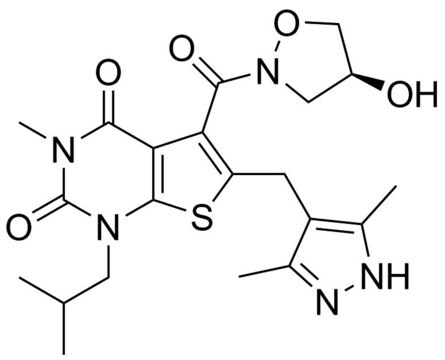C2020
α-Cyano-4-hydroxycinnamic acid
≥98% (TLC), powder, monocarboxylic acid transport inhibitor
Synonym(s):
α-CCA, α-CHCA, α-Cyano, 4-HCCA, ACCA
About This Item
Recommended Products
product name
α-Cyano-4-hydroxycinnamic acid, ≥98% (TLC), powder
Quality Level
Assay
≥98% (TLC)
form
powder
color
yellow
mp
245-250 °C (lit.)
solubility
H2O: slightly soluble
methanol: water: soluble
polar organic solvents: soluble
storage temp.
2-8°C
SMILES string
OC(=O)\C(=C\c1ccc(O)cc1)C#N
InChI
1S/C10H7NO3/c11-6-8(10(13)14)5-7-1-3-9(12)4-2-7/h1-5,12H,(H,13,14)/b8-5+
InChI key
AFVLVVWMAFSXCK-VMPITWQZSA-N
Looking for similar products? Visit Product Comparison Guide
Application
Biochem/physiol Actions
Signal Word
Warning
Hazard Statements
Precautionary Statements
Hazard Classifications
Skin Sens. 1B
Storage Class Code
11 - Combustible Solids
WGK
WGK 3
Flash Point(F)
Not applicable
Flash Point(C)
Not applicable
Personal Protective Equipment
Certificates of Analysis (COA)
Search for Certificates of Analysis (COA) by entering the products Lot/Batch Number. Lot and Batch Numbers can be found on a product’s label following the words ‘Lot’ or ‘Batch’.
Already Own This Product?
Find documentation for the products that you have recently purchased in the Document Library.
Customers Also Viewed
Articles
Warburg effect enhances glucose to lactate conversion in tumor cells, regardless of oxygen levels; impacting cancer metabolism since 1924.
Warburg effect enhances glucose to lactate conversion in tumor cells, regardless of oxygen levels; impacting cancer metabolism since 1924.
Warburg effect enhances glucose to lactate conversion in tumor cells, regardless of oxygen levels; impacting cancer metabolism since 1924.
Warburg effect enhances glucose to lactate conversion in tumor cells, regardless of oxygen levels; impacting cancer metabolism since 1924.
Related Content
ZipTip® micro-SPE pipette tips are used as a single-step desalting, concentration, and purification tool for complex samples before mass spec analyses.
ZipTip® micro-SPE pipette tips are used as a single-step desalting, concentration, and purification tool for complex samples before mass spec analyses.
ZipTip® micro-SPE pipette tips are used as a single-step desalting, concentration, and purification tool for complex samples before mass spec analyses.
ZipTip® micro-SPE pipette tips are used as a single-step desalting, concentration, and purification tool for complex samples before mass spec analyses.
Our team of scientists has experience in all areas of research including Life Science, Material Science, Chemical Synthesis, Chromatography, Analytical and many others.
Contact Technical Service











